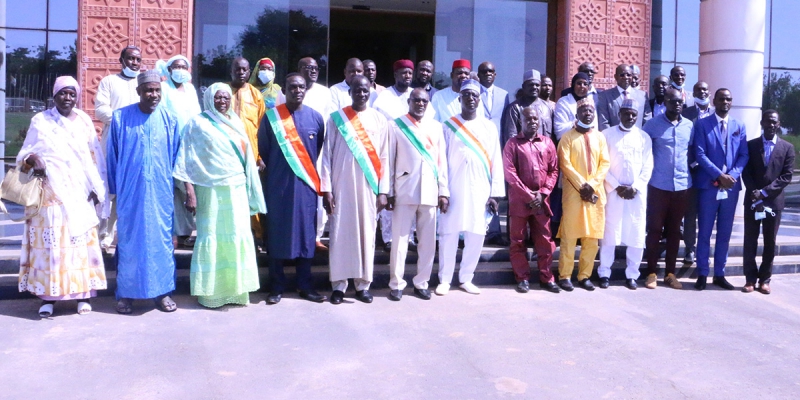On Wednesday, October 13, 2021, the International Conference Center Mahatma Gandhi of Niamey hosted the launch, of the Niger component of the AfWA project "Strengthening AfWA and operators’ capacity for the implementation of city-wide inclusive sanitation in Africa (SAO-CWIS)". This project, funded by the Bill and Melinda Gates Foundation, aims at strengthening the capacities of sanitation operators and contributing to the improvement of access to adequate sanitation services for 10 million people in 52 cities in Africa, including Niamey and Maradi in Niger.
The meeting was chaired by the technical advisor of the Minister of Water and Sanitation, Mrs. Saidou Fatimata, and was attended by the vice-presidents of the city councils of Niamey and Maradi, as well as all the stakeholders in the water, hygiene and sanitation sector of Niger.
Opening the workshop, the representative of the Minister reminded the efforts made by the Government since several years to provide the population with adequate hygiene and sanitation services, highlighting particularly the two fecal sludge treatment plants built in Niamey (one of which has been completed and the second with completion rate of 90%). "The Government of the 7th Republic has breathed new life into the hygiene and sanitation sub-sector through the adoption of the Water, Hygiene and Sanitation Sector Program (PROSEHA) aligned with the SDGs," said Ms. Saidou Fatimata.
Following the representative of the Minister, the City Council of Niamey and Maradi Vice Presidents described the situation of hygiene and sanitation in their county as a critical challenge that need to be addressed urgently. "The population of the city of Maradi is growing at an exponential rate with a current growth rate of 4.3%. This growth is certainly a source of insalubrity with an estimated volume of garbage of 40176 tons of waste evacuated and 12852 tons of fecal sludge emptied for the year 2021," said the first vice president of the City Council of Maradi, Mr. Laouali Issa.
The first vice-president of Niamey City Council, in his speech, stressed out the importance of addressing the issue of hygiene and sanitation. "The authorities of the city of Niamey are working hard to provide the population with drinking water and adequate sanitation and hygiene facilities to keep the population healthy ", said Mr. Habiboulahi Zanga.
The AfWA Sanitation Program Coordinator in charge of the CWIS project, Dr. Mbaye Mbéguéré, on behalf of the AfWA Executive Director, congratulated then the commitment and the clear political will of the authorities to improve access to adequate sanitation services to the Niger populations, that is also the vision of the African Water Association for Africa.
The CWIS program presented to the stakeholders
The opening ceremony was followed by three presentations: the first one was made by Mr. Maman Saley Maman Sani, AfWA's local expert who gave an overview of the sanitation situation at a national level and in particular in the cities of Niamey and Maradi.
Then Dr. Mbaye, presented the SAO-CWIS project, its objectives, the expected results, the approach used, the countries and cities involved, as well as the project components. He ended his presentation by encouraging the actors to join AfWA in order to benefit more from it.
Finally, Dr. Ernest ILBOUDO, representative of the REIP (Regional Implementing Partner) for the West Africa zone, the Training Center (CEMEAU) of the Burkina Faso Water and Sanitation Utility (ONEA°, presented his organization and their mission regarding the the implementation of the SAO-CWIS project in Niger.
The questions-and-answers session that followed the various presentations allowed AfWA to gather the participants' expectations and address their various concerns. The participants clearly expressed their satisfaction with the project and hope that it will help solve a large part of the sanitation problems in the two beneficiary cities.

 English
English  Français
Français 
